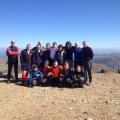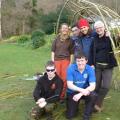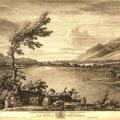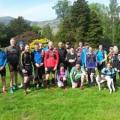News topics
Monthly Newsletters
// //// //// Online Booking //
// //// // // // // // //
For group bookings please contact
017687 77246 or
contact@derwentwater.org
Holme upon Spalding Moor Primary School, May 2019
May 2014

Last month we welcomed back one of our regular youth groups, the Gateshead Boys’ Brigade. Thank you to Daniel Wales for writing this report of his stay:
‘Our bags and rucksacks were packed and we set off for the Lake District. After a stop at an Activity Centre to do an assault course and enjoy a ride on an all-terrain vehicle we arrived at Derwentwater Independent Hostel, just outside Keswick. The hostel is just off the main road out of Keswick and has a football pitch and a lovely view of Derwent Water. We found our dorms and made up our beds, although I needed help with my duvet cover!
Down in the kitchen our leaders were preparing a delicious tea of chicken fajitas and apple strudel and custard. We were really hungry after all of our activities! As we were self-catering, we all pitched in to tidy up and leave the kitchen clean for other people to use. The hostel has a table tennis room, where I spent most of my free time playing with friends, a pool and table-football room, and a TV lounge. Just when it started to get dark we headed down to the lake side and lit a camp fire. We played games, sat around telling jokes, and toasted scones on the fire. It was really warm next to the fire and I loved the atmosphere. It was quite late by the time we got to bed and even later when we got to sleep, due to lots of chatter!
The following morning we packed our rucksacks, ready for a hike up Helvellyn. It was a very long way up, and steep at times. However, the view from the top was fantastic. We could see Scotland, the coast and many other mountains in the Lake District. I thought coming down would be easy but it turned out to be just as difficult. Eventually we made it down and enjoyed an ice cream in the sun. By the time we arrived back at the hostel all of our faces were bright red, so a leader headed off into Keswick to buy after-sun cream.
We relaxed in the hostel after our walk, and some of us even had a lie down on our beds! However, eventually the smell of spaghetti bolognaise drew us from our bunks and we headed to the dining room. Once fed we felt revived enough to play football until bedtime.
After breakfast the next morning we had a major tidy up in our dorms and then packed our bags, ready to leave. I was sorry to leave the hostel as I like spending time there. However, we had ghyll scrambling to look forward to near Wastwater before heading home. This is the second time I have stayed at the hostel and I hope I can go back again. It is a great place.’
We look forward to seeing Daniel and the Boys’ Brigade again!

What do you get if you cross CLIP conservation volunteers with coppicing and chocolate? Charcoal drawings and bonfire-baked chocolate cakes! In just two days a group of young people, who had never met each other before, became an inspirational team, using every minute of the day (and most of the night!) to improve our grounds, learn new skills, and make the most of our woodland resources.
We have been very fortunate to host several CLIP groups over the past 3 years, and each time we are amazed by the range of activities they achieve. The activities on this visit demonstrated excellent use of resources, with some delicious and highly artistic results.
On the first day Gareth Thomas of Woodmatters supervised some much-needed coppicing of the young beech trees at the top of the grounds, making an incredible difference in a short amount of time. With the left-over wood, he then showed everyone how to make charcoal, as well as techniques for whittling sticks. By the end of the day the group had also made a living willow arbour (it has developed a soft leafy canopy already!), some willow knives, a big bonfire, and some very useful barbeque sticks.
After a long day of enthusiastic hard work, the group then spent the whole of the evening outside, using their new skills and resources to fantastic effect: this was truly a zero-waste weekend! Here are two of the things they baked on the bonfire: whittled sticks wrapped in dough, flavoured with dried fruit and spices; and hollowed-out oranges filled with chocolate cake mix, wrapped in foil.
The following morning the group enjoyed a well-deserved session of dragon boating on Derwent Water: no doubt they are capable of making their own boats in the future! Then it was back to the hostel for a review of the weekend, using Saturday’s hand-made charcoal to draw pictures and diagrams.
Here are some of the comments (picture them in charcoal!) from the review:
‘I am now more confident in myself and feel that you do not need to change as people will accept you’
'I have gained key skills, such as developing group work as well as trying new things without hesitation'
Sarah Bisson, the Youth Project Officer told us: 'We have seen many young people through this project volunteer their own time to benefit others and their community - it truly is inspirational.
Thank you to everyone at CLIP for their inspirational projects. We hope you get a chance to come and lie under our willow arbour soon!
You can read more about CLIP conservation work on their blog: http://blogs.tcv.org.uk/

Keswick Museum and Art Gallery (KMAG) is open again after a major Heritage Lottery Fund renovation project, and we are part of their opening exhibition!
We were invited to choose an art work from the museum’s collection, and Katy went along on our behalf. She chose an engraving called A view of Derwentwater from Vicars Island towards Skiddaw, and here is the explanation for her choice:
‘Vicars Island (now known as Derwent Island), the viewpoint from which this engraving is made, has lots of connections to Barrow House. Barrow House was built in 1787 for the wealthy gentleman Joseph Pocklington, who at that time also owned Vicars Island (although he called it Pocklington’s Island).
Joseph Pocklington felled most of the trees on the island and quickly adorned it with a mansion (still there today) and several eccentric follies. The follies included a boathouse in the style of a non-conformist chapel, Fort Joseph, a mock church with painted doors and windows, a Druid Temple based on the nearby Castlerigg Stone Circle, and a battery from which Pocklington fired cannon to create echoes around the valley and demonstrate the grandeur of the mountains. The island was also the centre piece of the annual regattas which Pocklington and his friend Peter Crosthwaite organised between 1781 and 1790. They staged mock invasions of the island, held a fair on Crow Park, and organised a multitude of madcap races.
I like the idea of Derwent Island as a playground or a stage. The figures in the engraving are revelling in the timeless sense of adventure that you get from exploring an island and they remind me of the first time that I kayaked to Rampsholme (one of the other Derwent Water islands): I was so excited!
Derwent Island is now owned by the National Trust and you can visit the island on designated open days: this is your opportunity to put yourself in the frame of the picture and look at the view for real! Pocklington was able to purchase the island that he admired, but I am happy to settle for an engraving and the occasional open day! Thank you to Keswick Museum and Art Gallery and the National Trust for making the views from Derwent Island accessible for all.’
We hope you will be able to visit KMAG in person, but in the meantime you can enjoy this picture of our chosen art work.

On 23rd - 25th May we welcomed back High Terrain Events for their second trail running weekend of the year. They bounded around with endless energy, and I am sure their shoes were even more brightly coloured than last time! One of the participants, Paul Robertson, even found time to write a long blog about the weekend. Here are some extracts from his account (you can read the full blog here: http://192-miles.blogspot.co.
‘Wow, what a good weekend that was: 62km of trail running in total and I'm still smiling! On Saturday, after a hearty breakfast (the hostel did a good job here), and a brief talk about kit and what to carry with you, we were ready to go. We set off skirting the lake and then came our first climb of about 300m ascent, up to the col between Cat Bells and Maiden Moor. Half way up we were treated to a demonstration of the best way to run uphill. Lee, one of the team, ably demonstrated this like a young gazelle. He made it look incredibly easy, so we all tried to follow as ably, but failing to look so good. Then my favourite, the descent to Dale Head Tarn. We managed to avoid or miss the track and ended up running through a bog! It was then a nice steady jog along the Borrowdale Valley, back to the lake and the hostel. Some of us partook in 10 minutes of cold water therapy, standing in the cold lake water up to our waist to prevent the lactic acid build up. So, that was our 20km before lunch.
After lunch, High Terrain filled the afternoon with talks and discussions, which included nutrition and hydration strategies by Phil Smith. Phil also talked about injury treatment, prevention and management, where he debunked a lot of the theories and published research.
After dinner we went for a run up Walla Crag, behind the hostel. It was a marvellous run, with some great views of Keswick and the lake. There were some deer up there too. A night run in the hills adds another dimension to running: great fun.
Sunday started with a routine of core stability exercises: lots of fun with an elastic band, walking sideways with the band beneath the feet, holding up the ends to get nearly all the muscle groups working. It was quite a hard workout before a 30km run!
Then top ultra-runner Ricky Lightfoot arrived and led us on the long run. I took my turn to run alongside "The Man", asking questions about nutrition, shoes, and technique: the usual stuff runners talk about and which he has probably been asked hundreds of times before, but he was humble and patient and seemed to be enjoying the run and the banter.
The organisation by High Terrain was top notch and the camaraderie and spirit of the runners was superb, not forgetting the hostel staff who did a great job. Thanks to all involved in making this a cracking weekend.’
Thanks for this blog Paul: the endurance gene makes for some great ultra-blogging as well as all the running!
During May half term 30 Year 9 pupils from Ridgewood Academy, Doncaster, visited us for a two-night residential. This was a first for us and for them: an English-focused residential trip, combining a range of different activities from our new 360 Education + Adventure programme.
The theme of the 3 days was Description, looking at the ways in which the Lake District has been described for different purposes and audiences over the past 3 centuries. From Daniel Defoe’s seventeenth century tour, Gilpin’s search for the Picturesque, Hugh Walpole’s novel settings, John Dalton’s descriptive poem, and Thomas Gray’s epistolary journal, right up to descriptive pieces for Keswick Museum and the hostel website, the pupils studied a wide range of writing. However, before looking too closely at anything that had been written before, the pupils went on a local walk and wrote their own descriptive pieces, recording their initial impressions of the Lake District on a postcard. It was interesting to see that not many pupils had written a postcard before!
The itinerary for the trip was designed by Katy Moore, our 360 Education + Adventure officer, and she delivered several of the activities. The idea of 360 is to explore a theme from lots of different angles, incorporating different ways of learning, and this particular trip included: independent study; local walks; a poetry seminar with the Wordsworth Trust learning officer; visits to Dove Cottage, the Wordsworth Museum, and Keswick Museum and Art Gallery; activities in the hostel grounds to engage the five senses and build up an ‘adjective bank’; Canadian canoeing with Plattyplus; and quiet time to write a journal and a descriptive piece.
Next month we will feature one of the descriptive pieces that the Ridgewood pupils wrote during their stay. Perhaps one of their journals might also end up in a museum in 200 years’ time!





